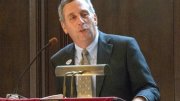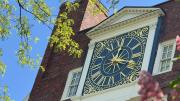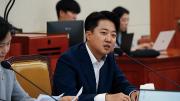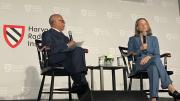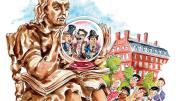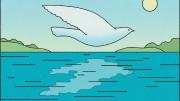President Lawrence S. Bacow delivered a Morning Prayers address on August 31, following a tradition in which the Harvard president speaks in Memorial Church at the beginning of the fall term. He began by thanking those in attendance for joining him, saying, “I actually cannot imagine a better way to begin my last academic year as your president.” Bacow added that he is filled with “hope and gratitude” over the positive changes that have begun to take hold as the pandemic wanes: “it finally feels as if we can live life again.”
At Harvard, a return to normalcy means the restoration of a community that considers issues with high stakes (Bacow cited, for example, a functioning democracy and a habitable planet) and one in which argument, therefore, holds a place of special privilege. He expanded on thoughts he’d shared with the freshmen class at their Convocation: “Over time,” he had told them on the previous day, “truth is revealed; it needs to be tested on the anvil of competing ideas. If you really seek the truth, you must engage with those who think differently than you” and “be willing to change your mind.” At Morning Prayers, he shared Rabbi Lord Jonathan Sacks’s argument for healthy debate. “We ought to argue… ‘out of a desire to discover the truth, not out of cantankerousness or a wish to prevail over [our fellows],’ not ‘out of envy and contentiousness and ambition for victory.’ When we argue for the sake of the latter… ‘what is at stake is not truth but power, and the result is that both sides suffer. If you win, I lose. But if I win, I also lose, because in diminishing you, I diminish myself […] The opposite is the case when the argument is for the sake of truth. If I win, I win. But if I lose, I also win—because being defeated by the truth is the only form of defeat that is also a victory.”
President Bacow’s full remarks follow:
Good morning, friends. Thank you for joining me here in this sacred space in this moment in truly the heart of our campus. I actually cannot imagine a better way to begin my last academic year as your president.
What will this semester bring? What will it bring for me? What will it bring for you? What will it bring for all of us? What will it bring for our community?
It’s been years since these questions have existed outside of the pandemic, outside of testing cadences, and dashboard statistics, and contingency plans. Yet—despite the presence and procession and persistence of all these new variants that we continue to worry about—it finally feels as if we can live life again. And I want to take this moment to recognize that change—and I hope we all can be filled with gratitude and hope for it.
So, here we are, at this moment in time, imagining our collective future together. A lot could go right this semester—or a lot could go wrong. Nothing is certain, I think, except for one thing: If you and I are all doing our jobs—doing what this institution demands and expects from each of us—what this nation needs from us at this moment—what the world needs of us, I guarantee you one thing—we will all be arguing.
Everywhere I think the stakes have gotten higher, and what we have to lose is truly at risk—a functioning democracy, a habitable planet, the list goes on—and I think this has all become clearer and clearer to many of us. Gone are the days of quiet assurance and polite acquiescence. If we stand for Veritas, we must speak for Veritas. We must be both its bearer and its defender.
Being quick to understand and slow to judge does not mean being unwilling to argue—it means arguing in a way that celebrates and strengthens our mission, that demonstrates the power of knowledge and the forbearance of wisdom.
Now in my own tradition, in the Jewish tradition, we have no definitive authority for resolving differences of agreement over the interpretation of texts or doctrine. None. There’s no bishop, there’s no pope. The way we resolve these differences is through argument. And indeed if you were to go into any yeshiva, a religious school, and observe students who are studying our sacred texts, they always do it in pairs. In fact, the imperative is to study with someone else. Why? Because more emerges through the dialogue between two students, through the different interpretations, than one can ever hope to achieve on their own.
I think this concept was captured beautifully by Rabbi Lord Jonathan Sacks’ argument for argument. And he said the following: We ought to argue, he asserts, “out of a desire to discover the truth, not out of cantankerousness or a wish to prevail over [our fellows],” not “out of envy and contentiousness and ambition for victory.”
When we argue for the sake of the latter, he continues, “what is at stake is not truth but power, and the result is that both sides actually suffer. If you win, I lose. But if I win, I also lose, because in diminishing you, I diminish myself […] The opposite is the case when the argument is for the sake of truth. If I win, I win. But if I lose, I also win—because being defeated by the truth is the only form of defeat that is also a victory.”
Rabbi Sacks referred to this type of argument as argument not for the sake of victory but argument for the sake of heaven. As we begin again to imagine the future—as individuals and as a community—may we all find ways to resist the lure of righteousness. To resist the lure of moral certitude. May we embrace the possibility of transcendence through argument. And may we live life again with greater appreciation of its fragility—and for our dependence also on one another.
Our beloved Harvard—and all the institutions that preserve and protect truth—must endure. And we, all of us, must do all that we can to see that they do, and we do so with gratitude and hope for our time and for times to come.
Thank you, take care, be kind, engage. It is indeed a blessing to share this fall with you.
